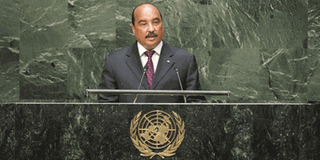Mauritania’s militancy mythology

PHOTO|BY IRIN
What you need to know:
- Last year, the Sahelian country hosted a regional summit to discuss ways local communities could work with the authorities to confront radicalisation, an initiative warmly endorsed by the United States.
Fast-modernising Mauritania presents itself as something of a showcase for how “to do” countering violent extremism, or CVE, in Africa.
Last year, the Sahelian country hosted a regional summit to discuss ways local communities could work with the authorities to confront radicalisation, an initiative warmly endorsed by the United States.
US Assistant Secretary of State Bisa Williams saluted Mauritania’s past record of success on CVE, and noted its strong reputation as a centre of Islamic learning whose scholars “are well-equipped to respond to assaults on the practice of Islam and espouse messages of peace”.
President Mohamed Ould Abdel Aziz has spoken confidently of Mauritania’s unique approach to tackling the challenge of “radical Islam” in a country that has been a self-styled Islamic republic since independence.
“De-radicalisation” has become the mantra – and the drop in radical violence over the last five years has been attributed to the Mauritanian way: a mix of a securityclampdown that has driven extremists out of the country, and the softer approach of CVE.
Prison dialogues held in 2011 between extremist prisoners and senior Muslim moderates are portrayed as a pioneering initiative, offering an inspiring example to neighbouring countries like Mali and Niger, contending with similar problems.
Abdel Aziz is still making the case for dialogue. In his Ramadan address to the nation in June, he appealed once again to Mauritania’s oulémas, or theologians, “to do more to promote the values of tolerance and social solidarity” and to use their wisdom to reach out “to the partisans of extremism”.
In Mauritania’s case, “the partisans of extremism” are the men and women that have fallen victim to malign influences from outside, most notably the Algerian-led Salafist Group for Preaching and Combat (GSPC), which developed into al-Qaeda in the Islamic Maghreb (AQIM) in 2007.
There have been sporadic attacks in Mauritania since the mid-1980s, including raids on the French and Israeli embassies; the kidnapping and killing of Westerners; and gun battles between the security forces and militants in the centre of Nouakchott.
Documents seized from the US commando raid on Osama bin Laden’s compound in Pakistan, released earlier this year, suggest that AQIM was considering a truce with the Mauritanian government in 2010, which could be a reflection of the success of the security drive.
The terms of the possible deal were that, for a guaranteed $11 million to $22 million a year, Mauritania would be spared any kidnappings or other terrorist activity on its soil. In return, all AQIM prisoners would be released and the government would avoid “any hostile attack against the brothers from its territories”.
There is no evidence in the correspondence that the government agreed to the proposal. Mauritania has denied the authenticity of the documents and its jihadist detainees remain in prison, although there have been some spectacular escapes.
The main danger seems to be the export of extremism rather than domestic insurgency. No other country in the region produces as many high-ranking ideologues in the Sahelian jihadist movement as Mauritania.
Nevertheless, Islamist militancy has frequently been presented as an existential threat to Mauritania’s stability. As recently as June 2015, US analyst Michael Rubin asked in the US publication Commentary: “Will Mauritania be the New Terrorist Haven?” likening Mauritania to southern Libya and warning of “AQIM’s unfettered access to most of the country”.
Similar warnings were being issued more than 10 years ago, focusing particularly on the fragility of the Mauritanian state, its deteriorating economy, and the multiple frustrations of a younger generation susceptible to radical ideas.
But it is unclear how much support violent extremism has in the country: nor to what extent it is a reflection of opposition to a narrow political elite, dominated by the country’s Moors, who are of Arab descent. Mauritania provided senior cadres to al-Qaeda and related movements well before the 2012 secessionist conflict in Mali. For example, Abu Hafs al-Mauritani was reputedly part of bin Laden’s inner circle, as a spiritual and political counsellor. Al-Mauritani was later imprisoned in Iran, transferred to Mauritania, and eventually released in July 2012.
During the conflict in Mali, Mauritanian nationals figured prominently among the Islamic guerrilla katibas, or brigades, battling the government.
The writer is a freelance journalist based in Dakar




